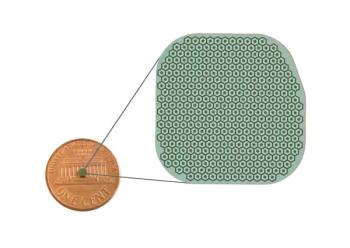
Supplements slow disease progression during late stage of dry AMD, study suggests
A new analysis by researchers at the National Institutes of Health shows the benefit of taking AREDS2 formula in late AMD.
A team of researchers at the National Institutes of Health (NIH), in a new analysis of data, have found that taking a daily supplement containing antioxidant vitamins and minerals can slow the progression of late-stage dry
According to an NIH/National Eye Institute news release, the researchers examined the original retinal scans of participants in the Age-Related Eye Diseases Studies (AREDS and AREDS2) and found that, for people with late-stage dry AMD, taking the antioxidant supplement slowed expansion of geographic atrophy (GA) regions towards the central foveal region of the retina.1
There were 392 eyes (318 participants) with GA in AREDS; 1210 eyes (891 participants) with GA in AREDS2. The researchers noted in the study the only treatments currently approved to slow GA progression in AMD require frequent intraocular injections with modest efficacy, important risks, and high costs.2
“The purpose of this study was to determine whether oral supplements slow GA progression in AMD,” the researchers wrote.
The study was published in the journal Ophthalmology. Tiarnan Keenan, MD, PhD, of NIH’s National Eye Institute, served as lead author of the study.
“We’ve known for a long time that AREDS2 supplements help slow the progression from intermediate to late AMD. Our analysis shows that taking AREDS2 supplements can also slow disease progression in people with late dry AMD,” Keenan said in the news release. “These findings support the continued use of AREDS2 supplements by people with late dry AMD.”
In their new analysis, the researchers reviewed the original retinal scans of participants in the AREDS (total 318 participants, 392 eyes) and AREDS2 (total 891 participants, 1210 eyes) trials who developed dry AMD, calculating the position and expansion rate of their regions of geographic atrophy. For those people who developed geographic atrophy in their central vision, the supplements had little benefit. But for the majority who developed geographic atrophy far from the fovea, the supplements slowed the rate of expansion towards the fovea by approximately 55% over an average of three years.2
In early and intermediate AMD, the retina develops small yellow deposits of fatty proteins called drusen. When the disease progresses to the late stage, people can develop leaky blood vessels (wet AMD) or can lose regions of light-sensitive cells in the retina (dry AMD). The geographic atrophy in these regions slowly expands over time, causing people to progressively lose their central vision.
The NIH noted in its news release the initial AREDS trialindicated that a supplement formula containing antioxidants (vitamin C, E, and beta-carotene), along with zinc and copper, could slow progression of intermediate to late-stage AMD.3
Moreover, the followup AREDS2 trial found that substituting the antioxidants lutein and zeaxanthin for beta-carotene improved the efficacy of the supplement formula and eliminated certain risks. At the time, neither trial detected any further benefit once participants had developed late-stage disease.4
According to the NIH news release, the initial analysis did not take into account a phenomenon in the dry form of late AMD called “foveal sparing.” While all regions of the retina are sensitive to light, the region that gives us the highest acuity central vision is called the fovea. Many patients diagnosed with dry AMD first develop geographic atrophy outside this foveal region, and they only lose their central vision when the geographic atrophy regions expand into the foveal area.
“Our high acuity central vision is essential for tasks like reading and driving. Given that there are few therapeutic options for people with late-stage dry AMD to retain or restore their vision, antioxidant supplementation is a simple step that may slow central vision loss, even for those with late disease,” Keenan concluded. “We plan to confirm these findings in a dedicated clinical trial in the near future.”
References:
Supplements slow disease progression during late stage of “dry” age-related macular degeneration. EurekAlert! Accessed July 17, 2024. https://www.eurekalert.org/news-releases/1051574
Tiarnan D.L. Keena, Elvira Argón, Pearse A. Keane, Amitha Domalpally, Emily Y. Chew. Oral Antioxidant and Litein/Zeaxanthin Supplements Slow Geographic Atrophy Progression to the Fovea in Age-Related Macular Degeneration. Ophthalmology. Published July 16, 2024. Accessed July 17, 2024. DOI: 10.1016/j.1016/j.ophtha.2024.07.014
Antioxidant Vitamins and Zinc Reduce Risk of Vision Loss from Age-Related Macular Degeneration | National Eye Institute. www.nei.nih.gov.
https://www.nei.nih.gov/about/news-and-events/news/antioxidant-vitamins-and-zinc-reduce-risk-vision-loss-age-related-macular-degeneration NIH study provides clarity on supplements for protection against blinding eye disease | National Eye Institute. www.nei.nih.gov. https://www.nei.nih.gov/about/news-and-events/news/nih-study-provides-clarity-supplements-protection-against-blinding-eye-disease
Newsletter
Want more insights like this? Subscribe to Optometry Times and get clinical pearls and practice tips delivered straight to your inbox.




























